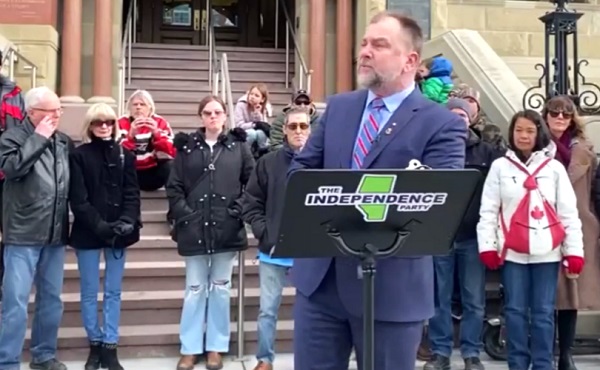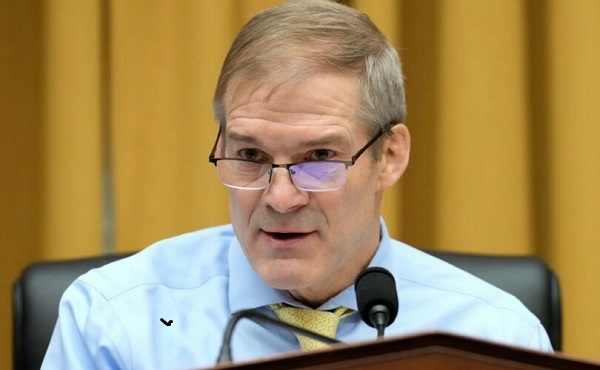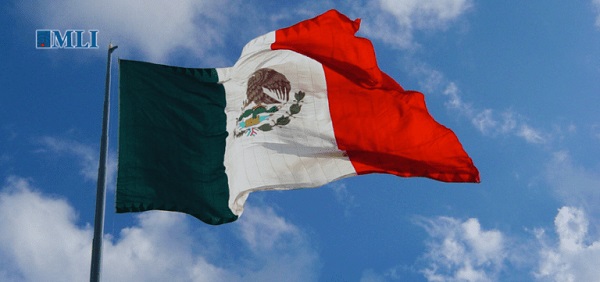Alberta
Alberta court upholds conviction of Pastor Artur Pawlowski for preaching at Freedom Convoy protest

From LifeSiteNews
Lawyers argued that Pastor Artur Pawlowski’s sermon was intended to encourage protesters to find a peaceful solution to the blockade, but the statement was characterized as a call for mischief.
An Alberta Court of Appeal ruled that Calgary Pastor Artur Pawlowski is guilty of mischief for his sermon at the Freedom Convoy-related border protest blockade in February 2022 in Coutts, Alberta.
On October 29, Alberta Court of Appeal Justice Gordon Krinke sentenced the pro-freedom pastor to 60 days in jail for “counselling mischief” by encouraging protesters to continue blocking Highway 4 to protest COVID mandates.
“A reasonable person would understand the appellant’s speech to be an active inducement of the illegal activity that was ongoing and that the appellant intended for his speech to be so understood,” the decision reads.
Pawlowski addressed a group of truckers and protesters blocking entrance into the U.S. state of Montana on February 3, the fifth day of the Freedom Convoy-styled protest. He encouraged the protesters to “hold the line” after they had reportedly made a deal with Royal Canadian Mounted Police to leave the border crossing and travel to Edmonton.
“The eyes of the world are fixed right here on you guys. You are the heroes,” Pawlowski said. “Don’t you dare go breaking the line.”
After Pawlowski’s sermon, the protesters remained at the border crossing for two additional weeks. While his lawyers argued that his speech was made to encourage protesters to find a peaceful solution to the blockade, the statement is being characterized as a call for mischief.
Days later, on February 8, Pawlowski was arrested – for the fifth time – by an undercover SWAT team just before he was slated to speak again to the Coutts protesters.
He was subsequently jailed for nearly three months for what he said was for speaking out against COVID mandates, the subject of all the Freedom Convoy-related protests.
In Krinke’s decision, he argued that Pawlowski’s sermon incited the continuation of the protest, saying, “The Charter does not provide justification to anybody who incites a third party to commit such crimes.”
However, defence lawyer Sarah Miller pointed out that that Pawlowski’s sermon was protected under freedom of speech, an argument that Krinke quickly dismissed.
“While the appellant is correct that peaceful, lawful and nonviolent communication is entitled to protection, blockading a highway is an inherently aggressive and potentially violent form of conduct, designed to intimidate and impede the movement of third parties,” he wrote.
Pawlowski was released after the verdict. He has already spent 78 days in jail before the trial.
Pawlowski is the first Albertan to be charged for violating the province’s Critical Infrastructure Defence Act (CIDA), which was put in place in 2020 under then-Premier Jason Kenney.
The CIDA, however, was not put in place due to COVID mandates but rather after anti-pipeline protesters blockaded key infrastructure points such as railway lines in Alberta a few years ago.
Alberta
Alberta mother accuses health agency of trying to vaccinate son against her wishes

From LifeSiteNews
Alberta Health Services has been accused of attempting to vaccinate a child in school against his parent’s wishes.
On November 6, Alberta Health Services staffers visited Edmonton Hardisty School where they reportedly attempted to vaccinate a grade 6 student despite his parents signing a form stating that they did not wish for him to receive the vaccines.
“It is clear they do not prioritize parental rights, and in not doing so, they traumatize students,” the boy’s mother Kerri Findling told the Counter Signal.
During the school visit, AHS planned to vaccinate sixth graders with the HPV and hepatitis B vaccines. Notably, both HPV and hepatitis B are vaccines given to prevent diseases normally transmitted sexually.
Among the chief concerns about the HPV vaccine has been the high number of adverse reactions reported after taking it, including a case where a 16 year-old Australian girl was made infertile due to the vaccine.
Additionally, in 2008, the U.S. Food and Drug Administration received reports of 28 deaths associated with the HPV vaccine. Among the 6,723 adverse reactions reported that year, 142 were deemed life-threatening and 1,061 were considered serious.
Children whose parents had written “refused” on their forms were supposed to return to the classroom when the rest of the class was called into the vaccination area.
However, in this case, Findling alleged that AHS staffers told her son to proceed to the vaccination area, despite seeing that she had written “refused” on his form.
When the boy asked if he could return to the classroom, as he was certain his parents did not intend for him to receive the shots, the staff reportedly said “no.” However, he chose to return to the classroom anyway.
Shortly after, he was called into the office and taken back to the vaccination area. Findling said that her son then left the school building and braved the sub-zero temperatures to call his parents.
Following his parents’ arrival at the school, AHS claimed the incident was a misunderstanding due to a “new hire,” attesting that the mistake would have been caught before their son was vaccinated.
“If a student leaves the vaccination center without receiving the vaccine, it should be up to the parents to get the vaccine at a different time, if they so desire, not the school to enforce vaccination on behalf of AHS,” Findling declared.
Findling’s story comes just a few months after Alberta Premier Danielle Smith promised a new Bill of Rights affirming “God-given” parental authority over children.
A draft version of a forthcoming Alberta Bill of Rights provided to LifeSiteNews includes a provision beefing up parental rights, declaring the “freedom of parents to make informed decisions concerning the health, education, welfare and upbringing of their children.”
Alberta
Alberta’s fiscal update projects budget surplus, but fiscal fortunes could quickly turn

From the Fraser Institute
By Tegan Hill
According to the recent mid-year update tabled Thursday, the Smith government projects a $4.6 billion surplus in 2024/25, up from the $2.9 billion surplus projected just a few months ago. Despite the good news, Premier Smith must reduce spending to avoid budget deficits.
The fiscal update projects resource revenue of $20.3 billion in 2024/25. Today’s relatively high—but very volatile—resource revenue (including oil and gas royalties) is helping finance today’s spending and maintain a balanced budget. But it will not last forever.
For perspective, in just the last decade the Alberta government’s annual resource revenue has been as low as $2.8 billion (2015/16) and as high as $25.2 billion (2022/23).
And while the resource revenue rollercoaster is currently in Alberta’s favor, Finance Minister Nate Horner acknowledges that “risks are on the rise” as oil prices have dropped considerably and forecasters are projecting downward pressure on prices—all of which impacts resource revenue.
In fact, the government’s own estimates show a $1 change in oil prices results in an estimated $630 million revenue swing. So while the Smith government plans to maintain a surplus in 2024/25, a small change in oil prices could quickly plunge Alberta back into deficit. Premier Smith has warned that her government may fall into a budget deficit this fiscal year.
This should come as no surprise. Alberta’s been on the resource revenue rollercoaster for decades. Successive governments have increased spending during the good times of high resource revenue, but failed to rein in spending when resource revenues fell.
Previous research has shown that, in Alberta, a $1 increase in resource revenue is associated with an estimated 56-cent increase in program spending the following fiscal year (on a per-person, inflation-adjusted basis). However, a decline in resource revenue is not similarly associated with a reduction in program spending. This pattern has led to historically high levels of government spending—and budget deficits—even in more recent years.
Consider this: If this fiscal year the Smith government received an average level of resource revenue (based on levels over the last 10 years), it would receive approximately $13,000 per Albertan. Yet the government plans to spend nearly $15,000 per Albertan this fiscal year (after adjusting for inflation). That’s a huge gap of roughly $2,000—and it means the government is continuing to take big risks with the provincial budget.
Of course, if the government falls back into deficit there are implications for everyday Albertans.
When the government runs a deficit, it accumulates debt, which Albertans must pay to service. In 2024/25, the government’s debt interest payments will cost each Albertan nearly $650. That’s largely because, despite running surpluses over the last few years, Albertans are still paying for debt accumulated during the most recent string of deficits from 2008/09 to 2020/21 (excluding 2014/15), which only ended when the government enjoyed an unexpected windfall in resource revenue in 2021/22.
According to Thursday’s mid-year fiscal update, Alberta’s finances continue to be at risk. To avoid deficits, the Smith government should meaningfully reduce spending so that it’s aligned with more reliable, stable levels of revenue.
Author:
-

 Business2 days ago
Business2 days agoCBC’s business model is trapped in a very dark place
-

 Censorship Industrial Complex2 days ago
Censorship Industrial Complex2 days agoCongressional investigation into authors of ‘Disinformation Dozen’ intensifies
-

 Alberta2 days ago
Alberta2 days agoAlberta government announces review of Trudeau’s euthanasia regime
-

 Alberta1 day ago
Alberta1 day agoAlberta fiscal update: second quarter is outstanding, challenges ahead
-

 Business1 day ago
Business1 day agoTrump’s government efficiency department plans to cut $500 Billion in unauthorized expenditures, including funding for Planned Parenthood
-

 Crime1 day ago
Crime1 day agoMexican cartels are a direct threat to Canada’s public safety, and the future of North American trade
-

 Brownstone Institute16 hours ago
Brownstone Institute16 hours agoFirst Amendment Blues
-

 Bruce Dowbiggin2 days ago
Bruce Dowbiggin2 days agoThe Pathetic, Predictable Demise of Echo Journalism







